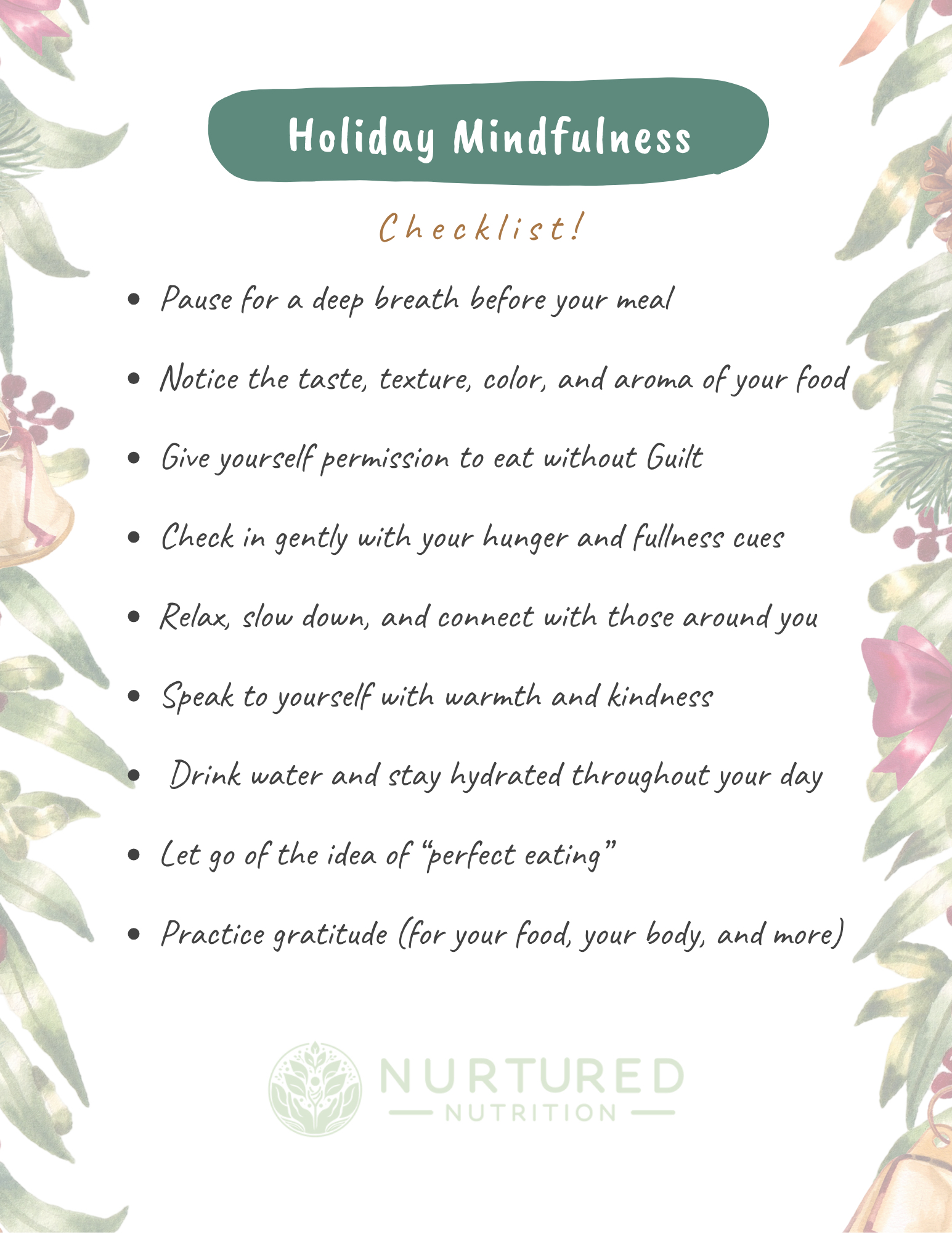
Staying Mindful Through the Holidays
It’s normal to feel pulled in different directions this time of year. You might find yourself eating past fullness, avoiding certain foods, or feeling disconnected from your body altogether. Mindful eating isn’t about “fixing” those moments – it’s about staying aware and compassionate through them.
These strategies aren’t only for calm, centered days. They’re for the real ones too – the ones where you feel stressed, distracted, or a little out of sync. Even small moments of presence can help you find your footing again.
1. Pause for a deep breath before your meal
This one simple habit can change the tone of an entire meal.
A deep breath helps calm your nervous system and brings your attention back to the present. It gives your body a signal that you’re safe and ready to receive nourishment. This small step can slow the pace of your entire meal. There’s ample evidence to suggest that eating slowly can drastically impact the quality of the meal and even how your body utilizes nutrients! Eating slowly yet comfortably is the best behavioral change one can incorporate into their toolbox.
If you notice yourself eating on autopilot or rushing, pause for a breath. That tiny reset can bring you back to yourself.
2. Notice the taste, texture, and aroma of your food
So often we eat while distracted – scrolling, talking, or thinking about what we “should” be eating. Try slowing down enough to actually notice your food.
What does it smell like? How does it feel in your mouth? What do you enjoy about it?
Engaging your senses helps you feel more satisfied and in tune with your body. It also helps shift the focus from control to curiosity.
3. Give yourself permission to eat without guilt
Guilt doesn’t make food choices better – it just makes them heavier.
Let yourself enjoy the foods you love. Permission isn’t the same as letting go of intention; it simply means you’re choosing from a place of trust instead of fear.
You can eat a holiday cookie and care about your health. Both can coexist. You’ll find that when permission is granted, you’ll make more intentional choices overall.
4. Check in with your hunger and fullness cues
Your hunger and fullness cues are like your body’s built-in feedback system. But during busy or emotional times, it’s easy to miss them.
Try checking in before, during, and after meals. Ask yourself:
“Am I getting hungry?”
“How does this food make me feel?”
“Am I comfortably full?”
Better yet, utilize the hunger scale for these regular check ins:

Even a small moment of awareness counts. If you realize you’ve eaten past fullness, it’s not a failure – it’s data for next time.
5. Relax, slow down, and connect with those around you
Food is meant to be shared. When you sit down to eat, permit yourself to be there. Enjoy the company, the conversation, and the moment.
Connection actually supports digestion, mood, and satisfaction. The people you’re with, and the energy at the table, matter just as much as what’s on your plate.
6. Speak to yourself with warmth and kindness
We tend to be our harshest critics, especially around food and body image. But negative self-talk doesn’t lead to better choices – it often leads to more stress and disconnection.
Try replacing judgment with curiosity.
Instead of “I shouldn’t have eaten that,” ask, “What was I needing right then?”
Kindness is not the absence of accountability – it’s the environment that makes real change possible.
7. Stay hydrated
Simple, but underrated. Hydration slips through the cracks when we’re busy or social, yet water supports digestion, energy, and mood – all things that impact eating.
Keep it easy: drink a glass of water before your meal, after coffee, or when you return home from a gathering. Hydration is a quiet form of self-respect.
8. Let go of the idea of “perfect eating”
Perfect eating doesn’t exist – and chasing it usually makes us feel worse. The goal isn’t to avoid every indulgence or get every portion right. It’s to notice, adjust, and keep moving forward.
You can practice mindfulness even after overeating or skipping a meal.
Instead of “What’s wrong with me?” try “What was going on for me?”
That shift in language opens the door to growth instead of shame.
9. Practice gratitude
Before or after a meal, pause for a moment of appreciation. For the food, the people, or even your own effort to show up differently this year.
Gratitude helps you shift from evaluation to connection. It reminds you that nourishment isn’t only physical – it’s emotional, relational, and mental too.
Mindfulness isn’t about doing the holidays perfectly. It’s about staying connected – to your body, your values, and what truly matters to you.
There will be moments of overeating, stress, or disconnection. That’s okay. You can always come back – one breath, one bite, one choice at a time.
At Nurtured Nutrition, we believe in a compassionate, weight-inclusive approach to health and healing. Whether you’re navigating eating disorder recovery, rebuilding trust with your body, or seeking support in creating sustainable, healthful habits, we’re here to walk alongside you—every step of the way.
Take the first step today and reach out to us here (https://nurturednutritionrd.com/contact-us/)

Enjoy a Life Where Every Meal is a Celebration, Not a Challenge.
We are here to guide you on a journey to a healthier, happier you. Take the first step towards a lifetime of wellness and schedule your initial consultation today and let our dietitians help you make every meal a joyful experience.
